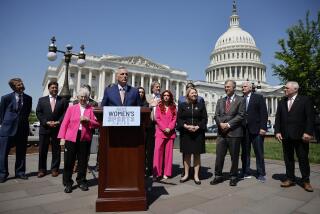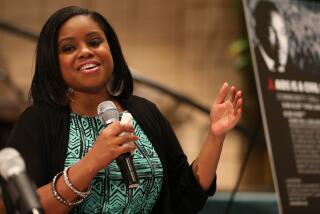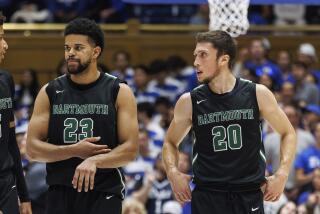Testing Not Mandatory in Pros, NCAA : Aftermath: HIV issue faces many of the same problems encountered by attempts to control drug use in sports world.
- Share via
When he first learned of Magic Johnson’s condition Wednesday night, NBA Commissioner David Stern said he felt as if he had been kicked in the gut.
Twenty-four hours later, the sports world still hasn’t caught its breath.
If the millions of cases of AIDS around the world could be described as mere pebbles in the stream of American consciousness, Johnson’s disclosure Thursday that he has tested positive for HIV is a boulder, capable of causing a wave of change in the sports world.
But not yet.
None of the four major professional sports nor the NCAA have mandatory AIDS testing, and none was ready to commit to it a day after Johnson’s announcement. But no one was ruling it out in the future.
Perhaps the most dramatic evidence of a possible change in policy came little more than an hour after Johnson’s Forum news conference. The Kings were arriving in the building for their game against the Vancouver Canucks.
Dr. Michael Mellman, the Lakers’ physician who is treating Johnson, made a stop in the Kings’ dressing room to brief the players.
“He told them,” King owner Bruce McNall said, “what Earvin wanted to get across: Anybody can get this if they don’t practice safe sex.”
The NHL hasn’t had to deal with a case of AIDS, but none of the players objected to Mellman’s visit.
To formalize such visits, however, will take some negotiation.
“I’m sure testing will be discussed,” the Kings’ Wayne Gretzky said. But that will entail, he conceded, getting into “individual rights.”
That’s a touchy subject right now in the NHL. Management and the players association are deadlocked in negotiations for a new collective bargaining agreement.
But why focus on athletes at all? That is the question posed by Donald Fehr, executive director of the Major League Baseball Players Assn.
“Something like this (the AIDS crisis) is of national if not international concern,” Fehr said from New York. “This is pandemic, if not epidemic. To suggest that professional sports is the place for it to be answered is pretty silly. If anybody would be responsible, it would be a governmental body. The reason you’re asking me about it is that it happened to a professional athlete, not a person in another profession. But it has no particular significance and nothing fundamentally to do with athletes. To attack this problem, you would have to have people with a societal reach.
“Unless the circumstances are absolutely essential to the industry, our view has always been that you do not do it (testing) on a mandatory basis. You do not invade one’s privacy.”
Fehr wouldn’t accept a justification for AIDS testing merely on grounds of health concerns because he feels it could open the door to other forms of testing, leaving no limits on the employer.
Even Johnson’s own league, the NBA, isn’t ready to unilaterally institute AIDS testing.
“All matters of testing,” Stern said Thursday, “are a subject to be discussed between the NBA and its players association . . . and that’s the way we’ll deal with this subject.”
NFL Commissioner Paul Tagliabue issued the following statement Friday: “A persuasive case for mandatory league-wide AIDS testing has not to date been presented to me or Dr. Lawrence Brown, the NFL’s medical adviser and well-respected expert on AIDS and HIV virus issues. The question presents medical, personal and psychological issues that individual team doctors can address in the course of developing club policies.”
The Raiders are among those who do test, so do the Philadelphia Eagles, although the players’ association protested that some Eagles were not aware that they had been tested. Some of the players in Tagliabue’s league were not in total agreement.
“We’re tested for drugs,” Phoenix Cardinal nose tackle Jim Wahler told the Associated Press. “I don’t see why we shouldn’t be tested for AIDS. There’s so much bloodshed on the football field. It’s for your own safety. I don’t think it’s an invasion of anybody’s privacy.”
No argument from teammate Ron Wolfley.
“I’d rather know,” the running back said. “I think people should be tested. Let’s face it, it’s a blood sport. The stuff flies around out there. If a guy tests positive, the rest of the league has a right to know.”
There have been no documented cases of transmission through cuts in any sporting event. The virus is passed through the exchange of bodily fluids, during sex with an infected partner, by way of blood transfusion or in the process of sharing contaminated intravenous needles.
One players’ association official, who requested anonymity, sees a better solution.
“I always tell any athlete that thought he or she had this or any other significant medical problem,” the official said, “that the only intelligent thing is to go and have it checked. But to be required to be tested is quite something else.”
Jerry Smith is the only known former NFL player to die of AIDS.
In his book, “The Jock’s Itch,” Texas Ranger pitching coach Tom House says that only 17% of professional athletes offered AIDS tests have volunteered to take them. House doesn’t cite any source for his figure.
He writes: “Even in this era of sexual caution, most athletes turn their heads from the warnings of AIDS.”
Randall Dick, assistant director of Sports Sciences for the NCAA, says the issue of testing won’t be brought up before the proper collegiate body to deal with it--the Committee on Competitive Safeguards and Medical Aspects of Sport--before February at the earliest.
“My understanding is that this disease can be latent,” said Dick from Kansas City. “So you can give a test, but what does that really tell you? The results can be negative, but you still may have it.”
While there is no formal AIDS testing of athletes at USC, the general student body is constantly exposed to warnings about the disease, through everything from an AIDS awareness week to condom giveaways.
That awareness will only grow, through official or unofficial channels, in the wake of the Johnson disclosure.
One issue raised in the case of colleges is the cost of AIDS testing where hundreds of athletes are involved. According to Dr. Wilbur Jordan of the Drew School of Medicine in Los Angeles, the average cost of an HIV screen ranges from $35 to $50. It is a simple test in which blood is taken and examined.
Friday, Rex Chapman of the Charlotte Hornets announced he and his wife, Bridgette, are donating $50,000 to HIV research.
Times staff writer Danny Robbins and columnist Allan Malamud contributed to this story.
More to Read
Go beyond the scoreboard
Get the latest on L.A.'s teams in the daily Sports Report newsletter.
You may occasionally receive promotional content from the Los Angeles Times.










